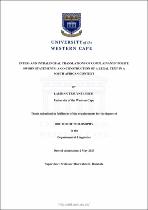| dc.contributor.advisor | Ralarala, Monwabisi K. | |
| dc.contributor.author | Lesch, Laurian Teslyne | |
| dc.date.accessioned | 2024-03-13T08:51:40Z | |
| dc.date.available | 2024-03-13T08:51:40Z | |
| dc.date.issued | 2024 | |
| dc.identifier.uri | http://hdl.handle.net/11394/10671 | |
| dc.description | Philosophiae Doctor - PhD | en_US |
| dc.description.abstract | English is the dominant language of record in the South African criminal justice system, despite the constitutional provision that affords all twelve languages equal status and usage. As a result of English hegemony, sworn statements are constructed through the medium of English and in some cases in Afrikaans. In cases where the accused, the witness or the complainant has limited understanding of either of these languages, the retelling and rewriting of complainants’ legal narratives is done by police officers, who translate such narratives from the source text (ST) into the target text (TT) to facilitate and benefit the legal process. Hence, both interlingual and intralingual translation may take place. Of note is that a sworn statement lays the foundation for the administration of justice. Its value lies in its accuracy, whether it is an inter- or intralingual translation. This study investigates the problem of inter- and intralingual translations with specific reference to legal translation of complainants’ sworn statements by police officers within the South African Police Service (SAPS). | en_US |
| dc.language.iso | en | en_US |
| dc.publisher | University of the Western Cape | en_US |
| dc.subject | English | en_US |
| dc.subject | Police officers | en_US |
| dc.subject | Intralingual translations | en_US |
| dc.subject | Administration of justice | en_US |
| dc.title | Inter- and intralingual translations of complainants’ police sworn statements: a co-construction of a legal text in a South African context | en_US |
| dc.rights.holder | University of the Western Cape | en_US |

